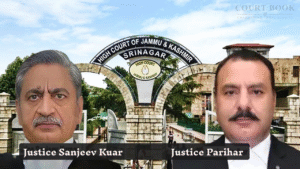The Supreme Court recently reinforced the protective nature of Section 24 of the Juvenile Justice (Care and Protection of Children) Act, 2015, stating that juveniles should not suffer disqualification due to past convictions. The Court emphasized that retaining or disclosing juvenile conviction records contradicts the legislative intent behind the Act, which aims to rehabilitate and reintegrate juveniles into society.
“By expressly stating that ‘a child shall not suffer disqualification, if any, attached to a conviction,’ Section 24 creates a unique safeguard for juveniles under the justice system.” – Supreme Court
Background of the Case
In this case, the appellant, Lokesh Kumar, was convicted by the Juvenile Justice Board in 2021 for misbehaving, abusing, and beating a person. The Board sentenced him to sit before it till the session ended and imposed a fine of Rs. 600.
Read Also:- Supreme Court Lays Down Key Principles on Proportionality of Punishment for Legislators
In 2024, when Lokesh applied for a job at SIS Case Services Ltd., he was required to submit a character certificate. However, the Superintendent of Police included his juvenile conviction details in the certificate. Lokesh challenged this disclosure, stating that it adversely affected his employment prospects and violated Section 24 of the JJ Act.
High Court’s Decision
Lokesh initially approached the High Court, arguing that revealing his juvenile conviction contradicted the protections under the JJ Act. However, the High Court dismissed his petition, reasoning that he should challenge the conviction before the competent authority under the Act. This prompted Lokesh to appeal to the Supreme Court.
Supreme Court’s Observations
The Supreme Court examined Section 24 along with Section 3(xiv) of the JJ Act, which states:
“All past records of any child under the Juvenile Justice system shall be erased, except in special circumstances.”
The Court noted that the purpose of the JJ Act is to prevent a juvenile's past mistakes from hindering their future prospects. It highlighted that juvenile records should not be disclosed in official documents like character certificates.
“The appellant's offense did not involve a heinous crime or a threat to public safety. Continuing to display such records contradicts the Act’s rehabilitative intent.” – Supreme Court
The Court further explained that Section 24(2) mandates the destruction of juvenile conviction records after a prescribed period, reinforcing the fresh start principle.
Key Ruling by the Supreme Court
- The High Court erred in dismissing the petition on the grounds of an alternative remedy, as the core issue was the illegal disclosure of juvenile records, not the conviction itself.
- Section 24 of the JJ Act, 2015, explicitly protects juveniles from disqualification due to past convictions.
- Official authorities, including the police, must not disclose juvenile conviction records in character certificates or background verification processes.
- The character certificate issued to Lokesh Kumar, which mentioned his juvenile conviction, was quashed.
- Authorities were strictly directed to comply with this ruling and ensure that juvenile records are not used against individuals in the future.
“By dismissing the appellant’s challenge on grounds of an alternative remedy, the High Court inadvertently frustrated the Legislature’s mandate. The Supreme Court intervenes to uphold the legal protection provided by Section 24.”
With this ruling, the Supreme Court reaffirmed the importance of protecting juveniles from lifelong stigma due to past offenses. The judgment sets a precedent ensuring that no juvenile faces disqualification or barriers to opportunities due to past mistakes.
Case name: LOKESH KUMAR v. STATE OF CHHATTISGARH & ANR., ARISING FROM SLP(Crl.) No(s). 851/2025















